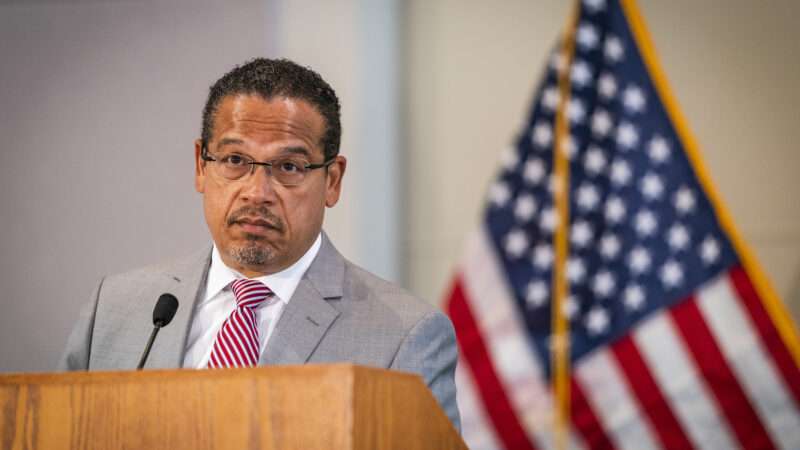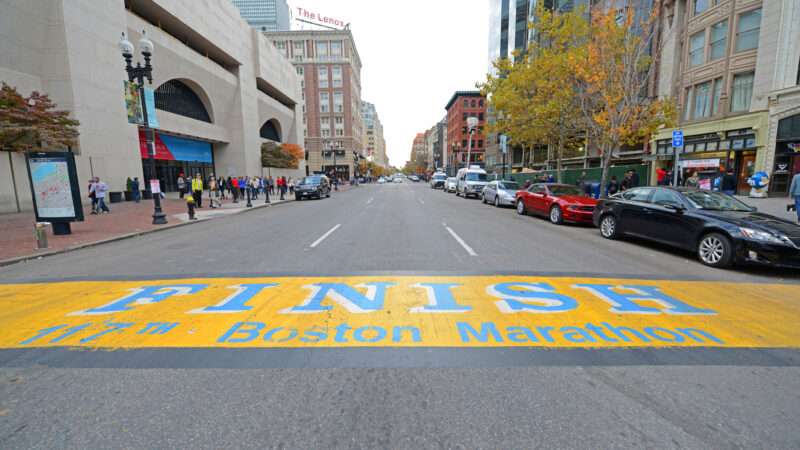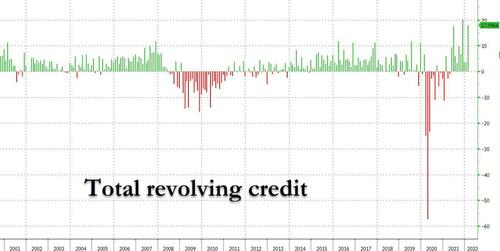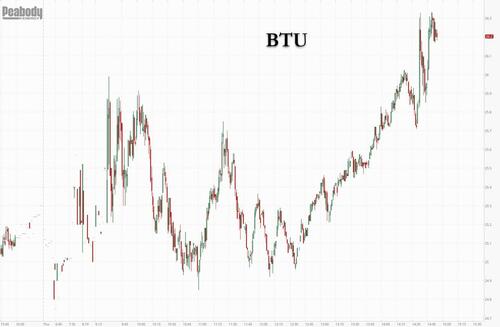
Eight seconds after a Minneapolis SWAT team entered the apartment where Amir Locke was sleeping on a living room couch, Officer Mark Hanneman shot him dead. A joint report that Minnesota Attorney General Keith Ellison and Hennepin County Attorney Michael Freeman released yesterday uses footage from six body cameras to break those seconds down into tiny pieces, describing what each officer was doing and what he could see at any given moment. The bottom line: Ellison and Freeman say criminal charges will not be filed against Hanneman or any of the other officers who participated in the deadly February 2 raid, because they reacted appropriately to what they reasonably perceived as a lethal threat—the handgun that Locke picked up after the cops stormed into the apartment.
At the same time, Ellison and Freeman describe Locke as “a victim” and concede that his reaction to the pre-dawn, no-knock raid “was not per se unreasonable.” In fact, they say, “We recognize that Mr. Locke may have been sleeping and that he, like others in the apartment, may have perceived the officers’ entry to be someone breaking into the apartment. We do not dispute this and believe that it is possible that is exactly what happened here.”
The implication is that Locke and Hanneman both acted in self-defense: Locke was justified in grabbing his gun, and Hanneman was justified in responding by shooting him. That perplexing situation, which is similar to what happened during the March 2020 drug raid that killed Breonna Taylor in Louisville, underlines the dangers of police tactics that aim to reduce the risk of violence but often have the opposite effect.
The SWAT team was assisting the St. Paul Police Department in a homicide investigation, but Locke was neither a suspect nor a person of interest. The cops were looking for his cousin, Mekhi Speed, who lived on a different floor of the same apartment building. Locke, a 22-year-old aspiring hip-hop artist, was staying with Mekhi’s brother, Marlon Speed, who shared the apartment with his girlfriend. St. Paul police originally obtained “knock and announce” warrants for Mekhi Speed’s apartment, his brother’s place, and a third unit where “the suspect and his associates often convened.”
Minneapolis SWAT officers refused to participate unless the warrants were changed so that they were authorized to enter early in the morning without first announcing themselves. From their perspective, that was a prudent precaution, since their main target was a murder suspect who was known to be armed. Ellison and Freeman note that police knew “the primary suspect and two other suspects had recently made social media posts in which they were seen with multiple firearms; that the suspects were associated with multiple armed robberies and carjackings; and that the .223 caliber rifle used in the homicide had not yet been recovered.”
Bodycam video shows Officer Aaron Pearson using a key obtained from the building’s manager to quietly unlock the door to Marlon Speed’s seventh-floor apartment at 6:48 a.m., 12 minutes before dawn. Sgt. John Sysaath, the first officer to cross the threshold, shouts “police, search warrant” as he enters. The other officers do likewise, their shouts overlapping each other. They issue a series of commands, including “show me your hands” and “get on the fucking ground.”
The report notes that “the living room is dark, with all of the blinds drawn, and the only source of light appears to be coming from the officers’ flashlights.” But the officers can see that someone is lying on the couch under a blanket; he is moving around and briefly looks over the back of the couch at the intruders. The officers are alarmed that they initially cannot see Locke’s hands and even more alarmed when they see his right hand emerge from the blanket, holding a gun.
The cops, who have already searched the two other apartments without finding Marlon Speed or the other suspects, do not know who Locke is. They seem to think he could be one of the suspects, which would make him dangerous as well as armed. Locke’s finger is not on the trigger of the gun, but that could change at any moment. And as the police see it, Locke is deliberately disobeying their commands.
According to the report, “the firearm is pointed in Officer Hanneman’s general direction” at one point, although it then “appears to move downwards, angling slightly towards the ground from its previous position of pointing straight out to the side, roughly parallel to the ground.” The gun “continues to angle further downwards, now appearing to be around 45 degrees lower from where it initially was and around 45 degrees above the ground.” But that too could change in an instant. “Show me your hands,” Hanneman says, and “within the same second, a single gunshot is heard,” followed by two more.
“In this moment,” Hanneman later recalled, “I feared for my life and the lives of my teammates. I was convinced that the individual was going to fire their handgun and that I would suffer great bodily harm or death. I felt in this moment that if I did not use deadly force myself, I would likely be killed. There was no opportunity for me to reposition myself or retreat. There was no way for me to de-escalate this situation. The threat to my life and the lives of my teammates was imminent and terrifying.”
Ellison and Freeman, who consulted with use-of-force experts, found this explanation highly credible. Given the circumstances, they concluded, it would be impossible to prove beyond a reasonable doubt that Hanneman was not acting in defense of himself and his colleagues—an affirmative defense that prosecutors would have to overcome to obtain a conviction on any of the charges that Ellison and Freeman considered.
“The State would be unable to disprove beyond a reasonable doubt any of the elements of Minnesota’s use-of-deadly-force statute that authorizes the use of force by Officer Hanneman,” Ellison and Freeman said in a press release. “Nor would the State be able to prove beyond a reasonable doubt a criminal charge against any other officer involved in the decision-making that led to the death of Amir Locke.”
Ellison and Freeman’s legal analysis hinged on what “an objectively reasonable officer” would do in this situation, “based on the totality of the circumstances known to the officer at the time and without the benefit of hindsight.” They therefore were bound to consider the shooting from the perspective of Hanneman and the other officers at the scene, all of whom likewise said they perceived an imminent, deadly threat.
For prosecutors, Locke’s perspective is irrelevant to the question of whether criminal charges against the officers are justified. But for policy makers, Locke’s perspective is an essential consideration in weighing the risks and benefits of no-knock warrants and “dynamic entry” tactics.
If trained police officers found the situation “terrifying,” a groggy young man whose day began with a home invasion by half a dozen armed men surely would have been at least as frightened. And if the eight seconds that elapsed between the SWAT team’s entry and Hanneman’s decision to shoot Locke gave the officers no time to figure out who he was and why he was holding a gun, they likewise gave Locke no time to figure out who these men were and why they had stormed into the apartment.
Marlon Speed and his girlfriend, Tatyana Henderson, were in their bedroom at the time. According to the report, Speed “heard a noise in his sleep and ‘sat up a little bit,’ then ‘next thing’ he knew there was a gunshot.” Henderson “stated that she did not really know what was going on and that ‘they just came in my house…They shot somebody and then they like came in the room and then we were already on the ground.” To her, “it sounded like somebody was breaking in.” She “recalled hearing yelling and ‘just thought somebody like ran into my apartment or something,’ and then she heard multiple gunshots.”
According to Locke’s mother, he bought the gun to protect himself while working as a food delivery driver. That sort of armed self-defense, which involves carrying a gun in public, is the focus of a case that the Supreme Court is considering this term. But the Court already has recognized that using handguns “in defense of hearth and home” is a “core” right guaranteed by the Second Amendment. It seems clear that Locke was killed for exercising that right.
“Mr. Locke’s thoughts and intentions remain unknown and, sadly, can never be known,” Ellison and Freeman say in their report. “We do not know whether Mr. Locke was awake or asleep when the officers entered the apartment, nor do we know whether Mr. Locke thought the persons entering were police officers or unwelcome intruders. We are acutely aware that the nature of the officers’ ‘no-knock’ entry into the apartment, combined with the officers’ various, overlapping shouts and commands and shining of bright lights at Mr. Locke, likely startled and disoriented Mr. Locke. We are also cognizant that Mr. Locke’s reaction to the entry was not per se unreasonable.”
Ellison and Freeman are keen to make it clear that Hanneman’s exoneration does not amount to an indictment of Locke. “Amir Locke’s life mattered,” they say. “He was a young man with plans to move to Dallas, where he would be closer to his mom and—he hoped—build a career as a hip-hop artist, following in the musical footsteps of his father. He should be alive today, and his death is a tragedy. Amir Locke was not a suspect in the underlying Saint Paul criminal investigation nor was he named in the search warrants. Amir Locke is a victim. This tragedy may not have occurred absent the no-knock warrant used in this case.”
They elaborate on that last point: “No-knock warrants are highly risky and pose significant dangers to both law enforcement and the public, including to individuals who are not involved in any criminal activity. The fact that it is standard practice for paramedics to stand by at the scene when no-knock warrants are executed speaks to the foreseeably violent nature of this law enforcement tool. Local, state, and federal policy makers should seriously weigh the benefits of no-knock warrants, which are dangerous for both law enforcement and the public alike. Other cities, like Saint Paul, and some states, have ended the use of no-knock warrants entirely.”
St. Paul’s policy evidently is not as comprehensive as Ellison and Freeman imply. In this case, St. Paul police agreed to obtain the no-knock warrants that Minneapolis SWAT officers demanded as a condition of their assistance. In any event, the problem illustrated by Amir Locke’s senseless death goes beyond no-knock warrants. Even when police knock and announce themselves before they enter, they can easily be mistaken for criminals when they burst into a home at an hour when the residents are likely to be sleeping.
In Breonna Taylor’s case, Louisville police did knock, and they said they also identified themselves before breaking into her apartment in the middle of the night. The latter claim was disputed by all of Taylor’s neighbors, including one who later changed his account to fit the official story. But even if we assume that the cops did indeed shout “police, search warrant” before they entered, that does not mean that Taylor and her boyfriend, Kenneth Walker, who were in bed at the time, heard and understood that announcement.
Walker, who said he was “scared to death” by the tumult, insisted that neither he nor Taylor knew the intruders were cops. He grabbed a gun and fired a round at the intruders, wounding one of the officers. The cops responded with a hail of bullets that killed Taylor. Prosecutors implicitly conceded that Walker had a strong self-defense claim when they dropped the attempted murder charge they initially filed against him. But in that case, as in Locke’s, the state attorney general concluded that the cops who entered the apartment had acted as “an objectively reasonable officer” would in the same circumstances.
The problem in both cases was not the officers’ split-second decisions so much as the situation that made them necessary. The strategy of discouraging resistance by deliberately discombobulating people while serving warrants has for years led to similar outcomes in cities across the country. Such tragedies are completely predictable in a country where people have a constitutional right to keep guns in the home for self-defense and commonly do.
This well-established hazard has to be considered every time police enter a home, regardless of whether the warrant notionally requires that they give the residents a chance to answer the door. When police decide to surprise people by serving warrants in the middle of the night with an overwhelming show of force, there is little practical difference between banging on the door and quietly unlocking the door before charging in. Either approach creates a substantial risk that people will not understand what is going on. And if they dare to defend themselves, even “an objectively reasonable officer” is apt to perceive a danger that justifies the use of deadly force.
The post Minnesota's Attorney General Says the Cop Who Killed Amir Locke Was Defending Himself. So Was Locke. appeared first on Reason.com.
from Latest https://ift.tt/SGawjbQ
via IFTTT










